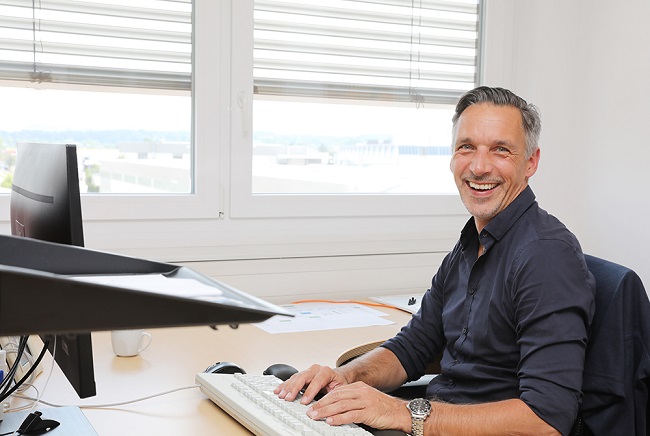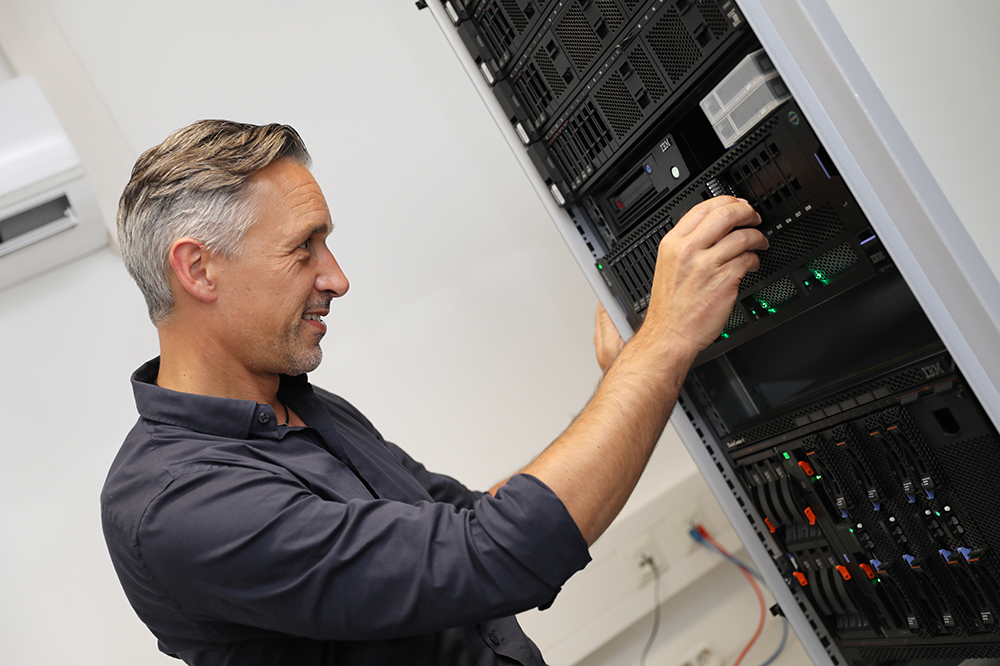Gilbert Müller-Guttenbrunn works in the IT department of Müller-Guttenbrunn, his office is located in Amstettner Industriestraße, where the headquarters of the entire Müller-Guttenbrunn Group is located. For almost 15 years, the IT expert has ensured that all IT concerns of the team members are solved quickly and competently. For the MGG relay interview, he leaves his familiar workplace to face some questions.

Gilbert Müller-Guttenbrunn spends most of his time in the EDP office in Amstetten.
Mr Müller-Guttenbrunn, as your name suggests, the Müller-Guttenbrunn company has been with you for a long time…
MÜLLER-GUTTENBRUNN: Of course, I have known the Müller-Guttenbrunn company since I was a child. I had my first internship here when I was 14 years old. It was exciting to get to know the big machines like the shredder, but I have always been fascinated by the IT sector. The industrial engineering branch at the HTL Waidhofen an der Ybbs therefore offered me a good school. I was able to further deepen my knowledge at the FH Technikum Wien. After graduating, I started my professional life at Bank Austria in the IT department, until I finally returned in 2008, where I was able to get a taste of working life for the first time: Back to Müller-Guttenbrunn.
What areas are you responsible for here?
MÜLLER-GUTTENBRUNN: Quite a few, not to say all IT topics. My tasks range from the entire planning and structure to purchasing, maintenance or the support of MGG employees in all IT matters. In other words, everything to do with servers, PCs, telephones, printers and other IT equipment. However, I am not alone, but work in a great team of three. Each of us has his or her own area of expertise, but at the end of the day, the three of us have to be able to deal with all the requests and challenges.
And who are your colleagues?
MÜLLER-GUTTENBRUNN: On the one hand, there is Armin Blutsch, who, among other things, is well known in the region as a former vice-president of the Austrian Federal Fire Brigade Association. Many years ago, he planned, set up and further developed the basic framework of the MGG EDP in the company. As his retirement is getting closer and closer, we were recently able to recruit another employee for our department. Jürgen Gleiß will basically follow in Armin’s footsteps. In addition, he has programming skills that we can use very well for smaller projects.
What programmes do you and your team work with?
MÜLLER-GUTTENBRUNN: We have an operating system that is a perfect alternative to Linux, iOS or Windows for us. On our mainframe, we work with the IBM i Series and use it to handle all our merchandise management and accounting. We don’t need any programmes with lots of extras for this area of work. Our utility is limited to the bare essentials and is therefore very reliable and fast. However, should we need new tools for data collection that the standard software does not have, Jürgen Gleiß can programme and implement them for us. However, we do not want to develop our own operating system, as this would be too costly and would require a lot of maintenance.
The large machines and shredders also contain IT-related technology. Do you also cover these machines?
MÜLLER-GUTTENBRUNN: Fortunately only marginally. Of course, there is a lot of electronics, electrical engineering and IT behind it. But if our shredders cause problems, the manufacturing companies have to take care of it. Some of the machines are integrated into our network, but that only concerns remote maintenance. IT-wise, there is no production or planning process that we have to programme in order to control them via our computers.
Have the work areas changed in recent years?
MÜLLER-GUTTENBRUNN: Yes, absolutely. In the past, we also had to look after the entire EDP of our subsidiary companies abroad. If there was a problem in Romania, for example, one of us had to pack our bags and solve it at the respective location. Now we save on business trips for the most part, because the companies either have their own trained staff or there is an external IT service provider on site. Above all, many things can be solved by telephone or remote maintenance.

Gilbert Müller-Guttenbrunn also keeps a cool head during server work.
Data security is an increasingly important issue. How does MGG deal with this?
MÜLLER-GUTTENBRUNN: Our data very rarely gets out. Normally it is not necessary to take work home. In recent years, we have had to offer home office solutions, but a VPN connection has kept us very secure. Our server is physically located here in the building. We also host it ourselves. Otherwise, we are careful about what is downloaded on our company devices. For example, the instant messaging service WhatsApp is strictly forbidden on all our company mobile phones. We have no problem with our colleagues using the company mobile phone privately as well. Thanks to dual-SIM smartphones, the secure separation of customer numbers and private data is very uncomplicated. The direct company mobile phone interface actually only needs access to contacts, calendar and e-mails. Microsoft Office and our management software are the only programmes that can also be used outside of our offices.
Have there ever been attacks on the system?
MÜLLER-GUTTENBRUNN: Yes, all the time. That is completely normal. Almost every PC but also mobile phones are affected by permanent automated hack attempts. Of course, we protect our devices with appropriate security programmes. That’s why there have been no real targeted attacks so far. However, it is difficult to say whether there is a virus or something similar nested somewhere in our data. The only existing risk, whereby data can fall into the wrong hands, is the user. But this can hardly be prevented – the only thing that helps here is targeted training and an understanding of IT matters by the staff.
How many computers do you look after altogether?
MÜLLER-GUTTENBRUNN: Actually not that many. In our three plants Metrec, Metran and Polymers there are about 90 computers in total. Nevertheless, it’s not boring, because if a printer doesn’t print here or a mobile phone doesn’t work there, we try to solve these problems. Maintenance, updates and all kinds of support for the staff are among my main tasks.
What qualifications do you need for this job?
MÜLLER-GUTTENBRUNN: I can only speak about our company. We don’t have high standards as far as upstream training is concerned. You don’t necessarily have to have studied to be able to work here. What is important is an interest in technology and the willingness to continuously develop oneself through learning-by-doing.
Does this work involve a lot of stress?
MÜLLER-GUTTENBRUNN: It depends. Most of the time it’s very relaxed. But if there are serious problems, of course we have to act quickly. However, our devices, systems and servers are so well equipped that we can identify and eliminate many sources of error in advance. Emergency power generators provide further security of supply. However, we often have to work at night or on weekends – especially when updates have to be installed or certain maintenance work has to be carried out during which no one else is allowed to be online.
Finally, we would like to ask you a few personal questions. Who is Gilbert Müller-Guttenbrunn in private?
MÜLLER-GUTTENBRUNN: I am the father of a 15-year-old daughter with whom I enjoy spending a lot of time. Since my divorce, I run our joint household and cook very often, for example. I wouldn’t say I’m passionate about confectionery or chef de cuisine, but we get by quite well (laughs).
When you’re not in the kitchen, are you still drawn to the PC in your private life?
MÜLLER-GUTTENBRUNN: No. I do have a computer at home, but I rarely use it. I catch myself only from time to time with the cell phone in the hand. I think many people feel that way nowadays. Otherwise, you can often find me above the clouds. For many years I have been a member of a flying club and a motorised flight instructor. Accordingly, I also like to fly a round myself – mainly in Austria.
Thank you very much for the interview. We wish you much more enjoyment with your exciting hobby – and of course continued success in your profession.
